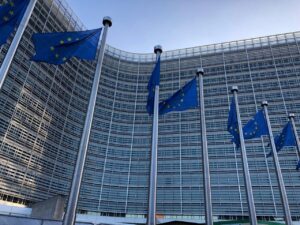– There is a word in German: Staatspolitische Verantwortung – political responsibility for the state: if Merkel cannot create a government with FDP and the Greens, so SPD remains the only option, they will create a government with the CDU to avoid new elections – says Malte Engelmann, Foreign Policy Advisor at the German Bundestag in an interview for BiznesAlert.pl.
BiznesAlert: What happened in Germany in the night between Sunday and Monday when coalition talks failed? Did you expect it?
Malte Engelmann: There is a difference between coalition talks and probings. After the election, social democrats claimed they would not join the government, so it was clear that „Jamaica” was the only possibility. I was of the opinion that the talks will be tough. You know, politics has sometimes features of a show. Politicians need to show their voters and members of their parties that they fight hard, but conservatives were sure that they needed this coalition.
Nobody considers AfD as a potential coalition partner, what about Die Linke?
In certain German local governments, like Thuringen or Berlin, Die Linke are in a coalition with social democrats. The topics of local politics are not ideologic. Die Linke want to quit NATO, dissolve the Bundeswehr! A left-wing government would not be possible either, since they would not reach majority in the Bundestag.
Quite a few members of AfD are former CDU who left the party because Merkel to them seemed too liberal and they are potential partners for conversations. Others are too far to the right, I will give you an example: AfD wanted to get a vice-president of the Bundestag, but their candidate refused religious freedom to Muslims. This meaning does fit to the authority and duty of a vice president of parliament. Religious freedom must be offered to everybody in Germany. So his candidacy failed. Other AfD member called a monument of murdered Jews „a monument of shame”. You cannot work with such people.
According to analyses, there are two possible scenarios at the moment: either a minority government or new elections.
A minority government is not a common solution in Germany. It is not easy because you have to look for a majority for every decision. Angela Merkel says that when she goes to summits, she needs to have a firm political support of her government.
There is a third scenario which I think will happen: a comeback of the Grand Coalition. According to the polls, results of new election would be nearly the same, so it would not change much. If you compare all the combinations, either „Jamaica” or the Grand Coalition is and will be possible. The idea of new election is not popular among the public – why do you need one, if you will get exactly the same effects? This will put pressure on SPD. There is a word in German: Staatspolitische Verantwortung – political responsibility for the state: if AfD and Die Linke do not support Merkel, and SPD remains the only option, they will create a government with the CDU.
If you watch German news, you can see social democrats taking the possibility of coalition talks into consideration. You can already see that something is changing. I think that it will take a couple of weeks when such voices will rise and we will have CDU-SPD coalition talks. Staatspolitische Verantwortung.
Can Angela Merkel use the whole situation to benefit from it in the end?
Right after the coalition talks were cancelled by the FDP, her position was weakened. But when the christian-democrats are attacked from the outside, they get close together. She has a very strong support of her party. If she manages to build a coalition, she will be even stronger: this will mean that she can build alliances even in extreme conditions. Even if CDU-SPD talks fail and new elections will be necessary, her position is secure because of CDU’s good polls – she will be the first candidate for a chancellor again.
What were the real reasons of „Jamaica” failure?
The topics were a side problem; the real reasons were much deeper. The „feeling” of the talks were bad from the very beginning. Intellectual origins of the Greens are in ’68 movement – hippies, against nuclear power, whereas the liberals are related to Austrian school of economics. They even look totally different; FDP party members are well-dressed and elegant, they would fit in a business conference. The Greens wear pullovers, and long beards. It is a cultural difference. It was not possible to get them together – if there is no trust, everybody has a feeling that it will not work.
The liberals did not make it to the Bundestag in previous elections and when they were Merkel’s coalition partners. This also made them very careful towards her. Social democrats have the same problem – their election score is widely viewed as a failure. It is already hard to create a coalition with one partner, but when you have CDU, CSU (CDU’s Bavarian sister party), and then Greens and FDP, you have to be careful. They were frightened, and they had little experience as well. Nearly all of them were new in the parliament. In the meantime, Merkel’s ministers have a 12-year long experience of governing.
When it comes to topics, they were really secondary. There were signs of agreements on the hardest topics on the last day of the talks. Also, when you are one of four members of a coalition and have 10 per cent support, you have to make concessions.
What about president’s Steinmeier’s stand towards the situation?
He is reluctant towards new elections and he is a social democrat. He was elected 9 months ago thanks to votes of christian democrats. It payed off – now the president can convince his home party members to rethink the coalition. It will be hard to refuse. This would be much harder with a christian democrat president. Steinmeier knows that the only ones who would benefit from new elections would be the radicals.
Does Gerhard Schröder have any influence on German politics?
Not really much. Of course, a former chancellor is a symbol and an important figure for the public, and when he talks, people listen. Members of his party suffered after the social reforms from the beginning of 2000s, that made Germany what it is now – a strong economy and a stable welfare state. The decisions that he made were especially hard for the social democrats – they were the reasons why SPD lost a lot of supporters, from which Die Linke benefited.
Former party leaders in Germany are greeted like pop stars at party conventions. Schröder is treated more critical. There was never a warm feeling between Schröder and social democrats, even when he was at power.
The other point is his engagement in Russia. People see his friendship with Putin and Russian oligarchs very critically because it has nothing to do with the idea of social democracy. He justifies it by saying that it is his private life and he is allowed to do whatever he wishes. But to be honest, once you become a chancellor, it sticks to you for the rest of your life.
A potential comeback of the Grand Coalition is crucial for Nord Stream 2, supported by SPD. It could harm Germany’s relations with its eastern partners within the EU.
Some might say that it is a business undertaking, but it is not true. Such projects are always about politics, especially about energy and security policy, also European policies and geopolitics
It would all be better if we had an agreement on that with our partners in the region. For Germany, claiming that security of Poland and the Baltic states is our goal on one hand and building Nord Stream 2 on another, would be inconsequent. Politics needs clear lines. Germany needs them in this case. Otherwise, it may lose its reliability in Europe.
Could Poland somehow help Germany about Nord Stream 2?
The problem of Nord Stream 2 is that it is in the grey zone between politics and business. Germany wants to have good relations with Russia, and with Poland and Baltic states at the same time. This topic is so difficult, that you can say Germany is a bit embarrassed about it. Of course Poland could help – we have good relations in spite of problems with present Polish government. I do not know if Poland could stop Nord Stream 2, but it if it worked on improving its relations with Germany, it would definitely have an influence on this case.
In fact, Germany is finally going to face a choice: either to build Nord Stream 2, or support Ukraine.
The problem of Nord Stream 2 is that it could get relations with Russia closer again, and this is also a political argument. Europe needs a good relations with Russia. On the other hand, we cannot accept breaking the international law. It is like having a good friend, who turns out to be a bully. We also want to support Ukraine. And in politics, you sometimes have to seek a solution in the middle. This is a dilemma of German foreign policy.
What are the relations between Germany and the Baltic states?
Germany and the Baltic states have a long common history. There used to be a big German minority in these countries as well. After the Crimea crisis, Germany saw the importance of security of the Baltic states and supported them strongly. There are German troops in Lithuania at the moment. This is also a big mental step for Germany – presence of German soldiers in Eastern countries do not cause historical associations anymore.
Interview by Michał Perzyński








